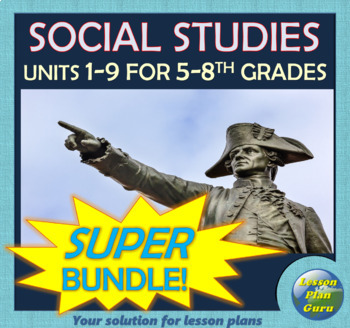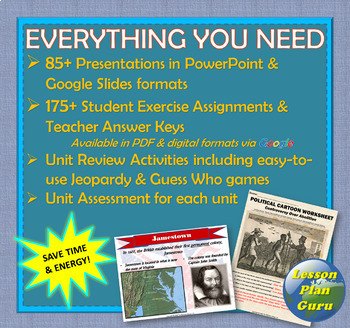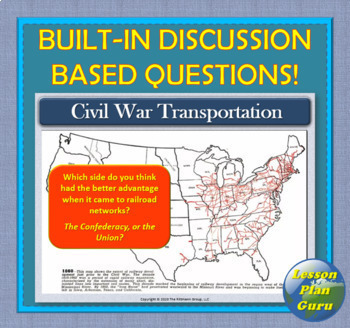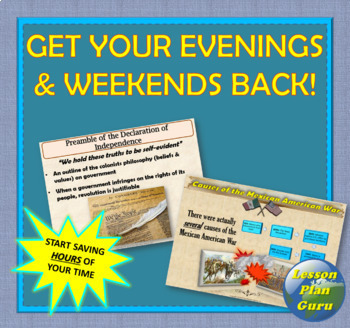Social Studies SUPER BUNDLE | Units 1-9 for 5th-8th Grades! | Google Apps!
- Zip
- Google Apps™

What educators are saying
Products in this Bundle (9)
showing 1-5 of 9 products
Description
The Social Studies SUPER BUNDLE Units 1-9 for 5th-8th grades is COMPLETELY ready for both in-person and digital learning (via Google Apps)! With this amazing Social Studies SUPER BUNDLE you'll receive EVERYTHING you need to cover the Age of Exploration all the way to the Reconstruction Era with your students, -PLUS- you'll also receive an Intro to U.S. Geography Unit -AND- Thinking Like a Historian Unit!!
***STOP the stressful and endless search for amazing, high-quality, and affordable Social Studies lesson plans RIGHT NOW!!***
The Social Studies SUPER BUNDLE is guaranteed to save you HOURS of lesson planning each week, including over SIX MONTHS of incredible lesson plans!!
*********************************************************************************************************
You'll receive ALL of the following:
- 175+ Student Exercise Assignments each with Teacher Answer Key
- 90+ links to supplemental YouTube videos
- 85+ Presentations with built-in Discussion Based Questions (DBQ) in both PowerPoint (PPT) & Google Slides formats
- 9 Unit Assessments with Teacher Answer Keys and Grading Rubric
- 8 Jeopardy Review Games fully functional & easy-to-use
- Unit Outlines and Lesson-by-Lesson Overviews for each unit
************************************************************************************************************
ALL of the resources included with this amazing bundle have been used with THOUSANDS of students with GREAT success. They've been designed and curated to offer maximum flexibility and can be used with students across a wide range of grades, specifically between 5th-8th grades!
To see how each of these units have been rated and reviewed by other teachers, or to learn more about them, here's the links to each one!
Unit 1: Intro to U.S. Geography
Unit 2: Thinking Like a Historian
Unit 3: Age of Exploration & Colonization in the New World
Unit 5: U.S. Constitution & Bill of Rights
Receive *EVERYTHING* you need to cover these topics:
Unit One: United States Geography - Introduction
Map Comprehension
- Applying geographic tools to interpret maps (latitude/longitude, scales, symbols, etc.)
- Main types of maps (physical maps, political maps, and thematic maps)
The 50 United States
- Identifying each state and its location in the U.S.
- State abbreviations and state capitals
Regions of the United States
- Economic, Physical, Political, and Climatological regions of the U.S.
- Examination of various regions such as Silicon Valley, the Rust Belt & Sun Belts, Census Regions, and more!
Physical Features and Significant Land Forms of the United States
- Locating and describing the significance of land forms such as the Rocky Mountains, Great Lakes, Mississippi River, and many others
Population and Settlement Patterns
- Identifying and explaining the importance of the largest population centers in the U.S.
Geographic Data
- What it can be used for and how it can be interpreted (census data, demographics, election results, etc.)
Unit Two: Thinking Like a Historian
Analyzing Information
- Strategies to draw conclusions and inferences, identify cause and effect relationships, make predictions, compare and contrast, and find the main idea
- How to summarize information clearly and concisely
Organizing Information
- Effective and efficient ways to organize information that is collected
Introductions to the Declaration of Independence, U.S. Constitution, and the Pledge of Allegiance
- Using these historical topics, students implement the historical inquiry strategies introduced to them and are assessed on their ability to properly use primary and secondary sources, analyze and organize information, and gain exposure to these historically significant documents
The Preamble of the United States Constitution
- Also included in this unit is a thorough breakdown of the Preamble, explaining and outlining its many purposes
- Exercises designed and aimed at helping students memorize the Preamble
Unit Three: Age of Exploration and Colonization in the New World
Age of Exploration
- What life as an explorer was really like
- Motivations to explore
- Christopher Columbus
European Colonization
- The meaning of "America"
- Mercantilism
- Defining what a "colony" is
French Exploration and Colonization
- Famous French explorers like Robert de La Salle and Jacques Cartier among others
- Impact of the fur trade
- French relations with Native Americans
Spanish Exploration and Colonization
- Famous Conquistadors Hernan Cortes and Francisco Pizzarro
- Significance of St. Augustine
- Columbus Day
English Exploration and Colonization
- The Mayflower Compact
- The Pilgrims
- Significance of Jamestown, Roanoke, and the Virginia House of Burgesses
The 13 Colonies
- Characteristics and traits of the New England Colonies, Middle Colonies, and the Southern Colonies
- Why each of the Original Colonies was founded
- Significance of early colonists such as Anne Hutchison, William Penn, and Benjamin Franklin among many others!
Economies of the 13 Colonies
- The Transatlantic Slave Trade/Middle Passage
- Slavery
- Cash crops, cottage industries, and subsistence farming
Dutch Colonization
- Impact of New Amsterdam
- Role of Peter Stuyvesant
Unit Four: The American Revolution
French and Indian War
- Who fought in it and why?
- The major battles of the war
- The effects of the war
The Stamp Act
- The Stamp Act Congress
- Causes and effects of the Stamp Act
The Townshend Acts
- Why the British enacted the Townshend Acts
- Effects of the Townshend Acts
Boston Massacre
- Crispus Attucks
- Sons of Liberty
- Causes and effects of the Boston Massacre
The Tea Act
- Causes and effects of the Tea Act
Boston Tea Party
- Factors that led up to the Boston Tea Party
- Who participated in the Boston Tea Party
- Significance of the Boston Tea Party
- Effects of the Boston Tea Party
The Coercive Acts (Intolerable Acts)
- Detailed outline of what the Coercive Acts were
- Why the British enacted the Coercive Acts
- How the colonies reacted to the passage of the Coercive Acts, including rallying behind Massachusetts
First Continental Congress
- Primary goals of the First Continental Congress
- Important individuals who were members of the First Continental Congress
Second Continental Congress
- Accomplishments and achievements of the Second Continental Congress
- Participants of the Second Continental Congress
- Olive Branch Petition
Declaration of Independence
- The five sections of the Declaration of Independence
- The Committee of Five: who they were, and their contributions
- Signers of the Declaration of Independence
- Declaration of Independence facts
Independence Hall
- Historical significance of Independence Hall
- Independence Hall facts
Liberty Bell
- What the Liberty Bell symbolizes and its historical significance
- How the Liberty Bell got its crack
Independence Day
- The meaning of Independence Day and its significance
Yankee Doodle
- The song's history: how it originated and its popularity spread
- Meaning of various lyrics in the song
Paul Revere's Midnight Ride
- Causes and effects of Paul Revere's Midnight Ride
- Analysis exercise of Henry Wadsworth Longfellow's poem Paul Revere's Ride
American Revolutionary War Battles
- Battle of Lexington
- Battle of Concord
- Battle of Bunker Hill
- Battle of Saratoga
- Battle of Yorktown
Valley Forge
- The significance of Valley Forge and it impact on the Revolutionary War effort
The Founding Fathers
- Who are the Founding Fathers?
- What makes someone a Founding Father?
- Overview of six of our best known Founding Fathers and their individual contributions towards the cause of American independence: John Adams, Benjamin Franklin, Alexander Hamilton, Thomas Jefferson, James Madison, and George Washington
Unit Five: U.S. Constitution, Bill of Rights, & Branches of the Government
Articles of Confederation
- Weaknesses of the Articles of Confederation
- Reasons to replace the Articles of Confederation
- Shays' Rebellion
- Economic Depression
Constitutional Convention
- Goals of the Constitutional Convention
- Replacing the Articles of Confederation
- Virginia Plan
- Opposition to the Virginia Plan
- Great Compromise
- Three Fifths Compromise
Preamble of the Constitution
- Importance of the Preamble to the U.S. Constitution
- Meaning of "We the People"
- Translation of the Preamble text into easy-to-understand terminology
Ratification of the Constitution
- Process of ratifying the Constitution
- Sequential order of ratification by state, from first to last
- Opposition to the Constitution
Constitutional Amendments
- Constitutional amendment process
- Historically significant amendments: 13th Amendment (slavery is abolished), 18th Amendment (prohibition), 19th Amendment (women's suffrage), 21st Amendment (repeals 18th Amendment), 26th Amendment (voting age is lowered to 21)
Bill of Rights
- Breakdown of each of the Bill of Rights 10 Amendments
- Translation of each amendment into easy-to-understand terms for students
Three Branches of Government
- Articles I, II, and III of the Constitution (Legislative Branch, Executive Branch, and Judicial Branches of the government)
- System of checks and balances
- Responsibilities of each branch of government
- Three levels of government (federal, state, and local)
- Responsibilities of each level of government
Alexander Hamilton
- The important role he played in the Constitutions creation
- His many contributions during the American Revolution and in the establishment of our government
- Hamilton-Burr duel
James Madison
- "Father of the Constitution"
- His important contributions towards the creation of the Constitution
- His prominent role in writing the Bill of Rights
Other Significant Individuals of the Constitution
- Roger Sherman
- George Mason
- Charles Pinckney
Constitution Day
- Importance and meaning of Constitution Day
Unit Six: Westward Expansion
Louisiana Purchase and the Lewis & Clark Expedition
- Causes and effects of the Louisiana Purchase
- Importance and achievements of the Lewis and Clark Expedition
War of 1812
- The numerous causes that led to the War of 1812
- Major battles of the war such as the Battle of New Orleans
- Lasting impact of the War of 1812 on America (renewed sense of patriotism, desire to expand the nations borders, etc.)
The Star-Spangled Banner
- Role of Francis Scott Key and the origins of its lyrics
- How it became our National Anthem
Manifest Destiny - Intro to Westward Expansion
- Factors that fueled Americans desire to grow the size of the nation
- Meaning and significance of Manifest Destiny
Indian Removal Act & Trail of Tears
- Causes and effects of the Indian Removal Act
- Lasting impact of the Trail of Tears
Texas Revolution and Independence
- Factors that led to the Texas Revolutionary War
- Important figures of the Texas Revolution such as Stephen F. Austin and Sam Houston
- Controversy over the annexation of Texas
Mexican-American War
- Causes and effects of the Mexican-American War including Mexican Cession
- U.S. war strategy in the Mexican-American War
- Factors which led to the wars high casualty rate for U.S. soldiers
Oregon Territory & the Oregon Trail
- Significance of the Oregon Trail
- Disputes over the Oregon Territory
- The Whitman Mission
California Gold Rush
- Causes and effects of the California Gold Rush
- Meaning of terms like "forty-niner" and "boom town"
Mormon Migration & Territory of Utah
- Factors that led to the Mormon Migration to Utah
- Role of important Mormons such as Joseph Smith and Brigham Young
The Homestead Act
- Why the Homestead Act was enacted
- Life of a homesteader and the many challenges they faced
Transcontinental Railroad
- Causes and effects of the Transcontinental Railroad
- Exploration of the various work groups who built the Transcontinental Railroad
- Challenges of building the Transcontinental Railroad
Unit 7: Sectionalism
Slavery in the U.S.
- Origins of slavery in the U.S.
- Causes and effects of slavery in the U.S.
- Significance of the cotton gin
- Role of slave labor in the Southern economy
- Life as a slave
Missouri Compromise & Compromise of 1850
- Preserving the equal balance of free and slave states
- What the passage of each meant to the expansion of the U.S.
- How each led to further sectionalism in the U.S.
- Contributions of Henry Clay
Abolitionists
- What is an abolitionist?
- Famous abolitionists like Frederick Douglass, Sojourner Truth, and Harriet Beecher Stowe, among others
- Significance of Uncle Tom's Cabin
Underground Railroad
- What it was and why it's historically significant
- How runaway slaves used the Underground Railroad
- Challenges and dangers of using the Underground Railroad
- Significance of individuals like Harriet Tubman
- Secrets and terms of the Underground Railroad
- Follow the Drinking Gourd
Fugitive Slave Act of 1850
- Causes and effects of the Fugitive Slave Act of 1850
- What was prohibited and required of citizens after its passage
- How the Fugitive Slave Act contributed to further sectionalism between the North and South
Kansas-Nebraska Act
- Causes and effects of the Kansas-Nebraska Act
- How the Kansas-Nebraska Act led to the creation of the two territories and eventual states
- Why the Kansas-Nebraska Act was controversial
- "Bleeding Kansas"
- Role of Stephen A. Douglas in the Kansas-Nebraska Act
Dred Scott Decision
- Who Dred Scott was and why his court case is historically significant
- Outcome of the Supreme Courts decision in the Dred Scott case
- How the Dred Scott decision further amplified sectionalism in the U.S. between the North and South
Illinois Senate Race of 1858
- How and why the Illinois Senate Race of 1858 is historically significant
- The Lincoln-Douglas Debates
Raid on Harpers Ferry
- What the raid on Harpers Ferry was
- Why the raid on Harpers Ferry is important
- Effects of the raid on Harpers Ferry and how it led to increased sectionalism between the North and South
Presidential Election of 1860
- The four main candidates of the election of 1860
- Split of the Democratic Party
- Effects of election of 1860, including Lincoln's victory in the election and significance of statements he made in his inaugural address
- How the South reacted to the election outcome including the secession of South Carolina
- Significance of events at Fort Sumter
Unit 8: Civil War
Abraham Lincoln
- How Abraham Lincoln's childhood and early adulthood molded his values and motivations to enter into politics
- The tragic circumstances surrounding President Lincoln's assassination and his historic funeral procession which followed
The Confederacy
- The meaning of secession/secede
- Which states seceded and joined the Confederacy
- Loyalty to Country, or State?
- The Confederate capital and Confederate president
Major Battles of the Civil War
- Fort Sumter
- Battle of Antietam
- Battle of Gettysburg (including the Gettysburg Address)
- Battle of Vicksburg, and more!
Regiments of the Civil War
- The meaning of regiment
- The 3 regiments during the Civil War: Artillery, Cavalry, & Infantry
- The roles and significance of each of the 3 regiments in the Civil War
Civil War Draft
- What a draft is and how and why governments use them
- Impact of laws that allowed men to avoid the draft
- Which wars the U.S. has used a draft during
Civil War Transportation
- Overview of the 4 main forms of transportation during the Civil War
- How each played a major role in the Civil War
- Advantages and disadvantages for each of the 4 forms of transportation
Union Blockade
- How it played an integral role in the Union strategy for winning the Civil War
- "Scott's Great Snake"
Generals of the Civil War
- Ulysses S. Grant
- George McClellan
- Robert E. Lee
- William Tecumseh Sherman, and more!
Emancipation Proclamation
- Causes and effects of the Emancipation Proclamation
- How white Union soldiers viewed the Emancipation Proclamation
Election of 1864
- How the Union capture of Atlanta and "Sherman's March" played a major role in the outcome of the election
- Campaign platforms of President Lincoln vs. General McClellan
- Examination of the election's results
13th Amendment
- Significance of the 13th Amendment to the Constitution
- How the 13th Amendment differed from the Emancipation Proclamation
Lincoln Assassination
- Motivations of Lincoln's assassin John Wilkes Booth
- Lincoln's funeral procession
- Plot to wipe out the Union government
Civil War Stats, Facts, & Maps
- Numerous maps to better convey to students the importance of geography and terrain during the Civil War, as well as, where battles took place
- Statistics and demographics to contextualize who actually fought in the Civil War and to the scale with which the Civil War truly was
Unit 9: Reconstruction
Black Codes
- What Black Codes were, how they were enacted and enforced, and the effects of Black Codes
- Examples of Black Codes such as vagrancy laws, convict lease laws, and property and wage laws
Radical Republicans
- The meaning of a Radical Republican
- Radical Republicans role during Reconstruction
- Prominent Radical Republican Thaddeus Stevens
Reconstruction Terms
- Freed People, Carpetbaggers, Segregation, Anti-Enticement, Civil Rights, Impeachment, Martial Law, and many more!
Reconstruction Amendments
- The causes and effects of the Reconstruction Amendments (13th, 14th & 15th Amendments)
- Breakdown of the five sections of the 14th Amendment
Role of the Freedmen's Bureau
- Why the federal government established the Freedmen's Bureau
- The goals of the Freedmen's Bureau
- The impact of the Freedmen's Bureau
Rise and Fall of Andrew Johnson
- How he became President Lincoln's vice-presidential running mate in the election of 1864
- Andrew Johnson's political background
- How Johnson and Lincoln had vastly different political beliefs
- Impeachment of Andrew Johnson
Civil Rights Act of 1866
- Main purpose and goals of the Civil Rights Act of 1866
- Why President Johnson opposed the Civil Rights Act of 1866
- How the Civil Rights Act of 1866 led to the creation of the 14th Amendment
Military Reconstruction Act
- Why the Military Reconstruction Act was passed by Congress and why President Johnson opposed it
- How and why ten former Confederate states were placed into five military districts
President Ulysses S. Grant
- How he rose to become the Republican nominee for president in 1868
- The unique and diverse challenges he faced and addressed as President
Secret Groups
- What were secret groups
- Why secret groups, such as the Ku Klux Klan, promoted discrimination and acts of violence, especially against African-Americans
Disenfranchisement Laws
- How the 15th Amendment led to such disenfranchisement laws like the poll tax and education requirements to vote
End of Reconstruction
- Why support for Reconstruction in the North became less popular as time went on
Effects of Reconstruction
- How Reconstruction had a profound and lasting impact on the nation even after it ended, especially in the South
- Exodusters & Sharecroppers
- Rise of Jim Crow Laws in the South
****************************************************************************************************************************************************
END the countless hours of stress, anxiety, and worry over creating and searching for high quality lesson plans and resources RIGHT NOW. We’ve done EVERYTHING for you!!
****************************************************************************************************************************************************
Receive EXCLUSIVE notice of sales and special offers by clicking HERE to follow us!
BE SURE TO CHECK OUR STORE’S REVIEWS TO GET AN EVEN BETTER IDEA OF THE EXTRAORDINARY VALUE YOU'LL RECEIVE WITH THESE AMAZING RESOURCES!!
We'd be humbled and honored to take care of your lesson plan needs so that you can spend more time actually teaching and maintaining a healthy work/life balance.
If you have any questions about this product, PLEASE don't hesitate to reach out to me directly at jillian@lessonplanguru.com
Thank you for visiting





